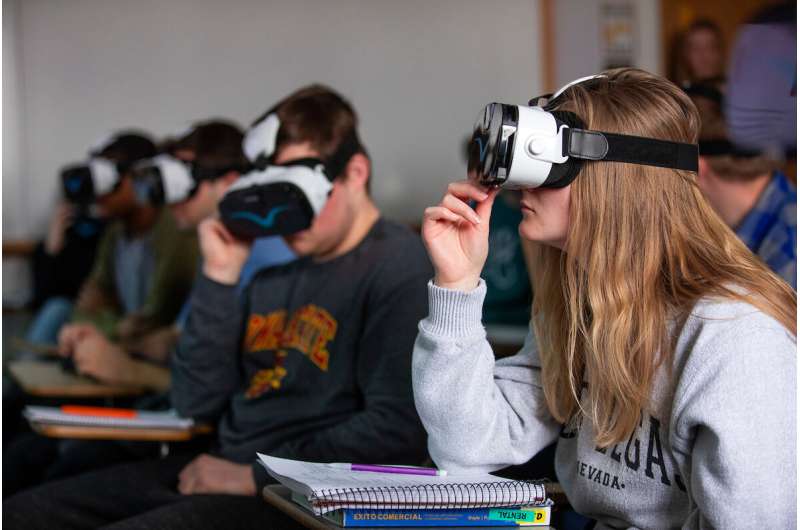
Iowa State researchers in psychology and engineering found women experience cybersickness with virtual reality headsets more often than men. Their ongoing work explores why this difference exists and options to help individuals adapt.
Psychology professor Jonathan Kelly studies human computer interaction, spatial cognition and virtual reality. He says gender discrepancies in cybersickness may not seem that important when it’s related to video games and other forms of entertainment.
“But it’s still a problem, and when VR gets to the point where it’s a bigger part of job training or education in a classroom, it’s even more important to make sure people can access this technology. If not, a lot of people are going to get left out, and there could be a backlash,” says Kelly.
Like motion sickness, cybersickness can occur when there’s a mismatch between visual motion and body motion. Symptoms, including nausea, dizziness, headaches and eye fatigue, usually resolve quickly after removing the headset. But in severe cases, they sometimes last for hours.
With ISU professor Michael Dorneich and associate professor Stephen Gilbert in industrial and manufacturing systems engineering, Kelly and his Ph.D. student, Taylor Doty, recently co-authored two related papers for the IEEE Virtual Reality Conference. The first paper provides an overview of existing research on gender and cybersickness, including their own findings.
As part of a larger study on adaptation to cybersickness, the ISU researchers recruited 150 participants to play up to 20 minutes of a VR game with a headset. The participants were new to VR and could stop if they felt too sick to continue. The researchers found women ended the game early twice as often as men and reported a sickness intensity that was 40% higher.
The paper also helps clarify why previous studies, many of which came from engineering or computer science, show conflicting results.
“A lot of the older papers that found no difference in cybersickness between men and women had very small sample sizes or a large gender imbalance. If the effect is small or individual differences are large, you may need 200 participants to identify statistically significant differences,” says Kelly. “I think this methodological expertise is something we in psychology can really provide. It also highlights the value of interdisciplinary collaboration to tackle complex problems like cybersickness.”
For the second paper, the researchers explored whether the distance between an individual’s pupils could help explain the gender difference in cybersickness. VR headsets have an adjustable lens set-up to accommodate different users, but some people fall outside the range. The researchers found women participants on average had smaller distances between their pupils than men, but it did not predict whether they would get cybersick during the game.
What seemed to matter more was whether they had previous experience with motion sickness or screen sickness (e.g., feeling sick in movie theaters, while playing a video game.)
“Women reported experiencing more motion sickness and screen-based sickness than men, and this increased susceptibility is part of the reason that women experience more cybersickness,” says Kelly.
From the wading pool to the deep end
The ISU researchers will continue to investigate the causes of cybersickness and methods to help individuals have a positive experience with VR.
“One of the things we’re doing now is comparing the settings of headsets and virtual environments to see which are most effective at reducing cybersickness for first-time users, and whether some are better than others for certain individuals,” says Kelly.
This includes adding “blinders,” which reduce the users’ peripheral vision while they move through a space, and options to teleport from point A to point B. Both reduce cybersickness by reducing visual stimulation.
The researchers will also study how these settings can be adjusted over time to help the user adapt comfortably and ease into VR. Kelly likens it to beginner swimming lessons in the zero-entry part of the pool, rather than the deep end.
Both papers were published as part of the 2023 IEEE Conference on Virtual Reality and 3D User Interfaces Abstracts and Workshops (VRW).
More information:
Jonathan W. Kelly et al, Gender differences in cybersickness: Clarifying confusion and identifying paths forward, 2023 IEEE Conference on Virtual Reality and 3D User Interfaces Abstracts and Workshops (VRW) (2023). DOI: 10.1109/VRW58643.2023.00067
Taylor A. Doty et al, Does interpupillary distance (IPD) relate to immediate cybersickness?, 2023 IEEE Conference on Virtual Reality and 3D User Interfaces Abstracts and Workshops (VRW) (2023). DOI: 10.1109/VRW58643.2023.00173
Citation:
Cybersickness more likely to affect women, ongoing research to understand why (2023, May 2)
retrieved 2 May 2023
from https://techxplore.com/news/2023-05-cybersickness-affect-women-ongoing.html
This document is subject to copyright. Apart from any fair dealing for the purpose of private study or research, no
part may be reproduced without the written permission. The content is provided for information purposes only.
For all the latest Technology News Click Here
For the latest news and updates, follow us on Google News.

